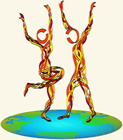Indigeneity in the Contemporary World: Performance, Politics, Belonging was a path-breaking interdisciplinary project conceived and led by Professor Helen Gilbert at Royal Holloway University of London and funded by the European Research Council from 2009–2014.
This team-based interdisciplinary initiative explored how indigeneity is expressed and understood in our complex, globalising world. The aim was to determine what indigeneity has come to mean in particular places and at key moments over the last several decades, and what kind of cultural, political, ethical and aesthetic issues are negotiated within its canvass. To address these questions, the research team analysed performance as a vital mode of cultural representation and a dynamic social practice. The research was multi-sited and multilingual, encompassing not only theatre, film, music and dance, but also mixed-media and digital work, Olympic pageantry, festival events, political protests and cultural displays within tourism ventures. In this context, we approached indigeneity as a fluid and contested concept with very particular local inflections and investments as well as variable global resonances. While the research focused on regions settled during the great era of European imperialism, notably Australia, the Pacific Islands, the Americas and South Africa, the project also addressed the transnational circulation of indigeneity as a highly marketable commodity, particularly in Western Europe.
 |
|
The project was organized within four broad conceptual themes: ‘Commodity and Spectacle’, ‘Heritage and Material Culture’, ‘Mobility and Belonging’ and ‘Reconciliation and Social Cohesion’. The work involved archival and field research in numerous countries and the hosting of yearly symposia and conference events, drawing more than 350 participants in total. Team members produced a rich variety of written, oral, digital and video publications, as well as working with indigenous artists to engage the public through free workshops, performances, interventions, discussions and consultancies. Project staff also mounted a 17-day exhibition, EcoCentrix: Indigenous Arts, Sustainable Acts, which attracted thousands of visitors and was short-listed for a UK National Engagement Award.
The Indigeneity in the Contemporary World project gained further ERC funding in 2013, in the form of a Proof of Concept grant to develop interactive components of the exhibition and run performance-based artist residencies in ethnographic museums in Berlin and London. This work led to printed and video resources documenting indigenous contributions to the European cultural sector and an open-access digital platform and archive, EcoCentrix Online, that will be in full operation from late 2016.
Building research capacity in transnational indigenous cultural studies has been one of the key functions of this innovative project. Over the course of nearly six years, it employed 12 early-career scholars from various parts of the world and fostered the work of a great many others, not only through planned events and publications but also through informal dialogues. Equally, the project team benefited from engaging with researchers, collaborators, artists, practitioners and indigenous advisors scattered across the globe. We wish to acknowledge the ERC for making possible research of this scale, scope, depth, quality, visibility, influence and reach.
An extensive account of the project’s highlights is given in our illustrated booklet, available here in pdf. Comments to helen.gilbert@rhul.ac.uk are welcome.
|
